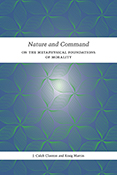Nature and Command
On the Metaphysical Foundations of Morality

“I enthusiastically recommend Clanton and Martin’s Nature and Command to those looking for a clear, thoughtful, and historically informed guide through the dialectic between natural law and divine command theories. Their ‘combination’ approach deserves a hearing as an important contribution to theistic metaethics.”— Christopher Tollefsen, professor of philosophy at the University of South Carolina
“Among publications on divine command ethics, Nature and Command is exceptional in the extent to which historical sources, both philosophical and theological, are incorporated into the line of argumentation. The authors mine sources from the medieval period, Renaissance scholasticism, the Reformation, modern philosophy, and Protestant theology in making their case.”— Janine Marie Idziak, editor of Divine Command Morality: Historical and Contemporary Readings
“Nature and Command proposes a new and exciting approach whereby God’s commands and the natural law each explain different parts of the moral law. It is a wonderful book and essential reading for anyone interested in the relationship between God and morality!”— Christian B. Miller, A.C. Reid Professor of Philosophy, Wake Forest University and author of The Character Gap: How Good Are We?
____________________________________________________________
Since at least the time of Plato, religious explanations of the metaphysical foundations of morality have typically fallen into one of two camps: natural law theory, according to which morality is fundamentally explained by facts about human nature—facts that God is responsible for—and divine command theory, which holds that moral obligations arise directly from God’s commands or some other prescriptive act of the divine will. J. Caleb Clanton and Kraig Martin offer an accessible analysis of these traditional views, reconstruct the various arguments for and against them, and offer an extended consideration of the historical emergence of the divide between these positions within the Christian tradition. Nature and Command goes on to develop and defend a theory that combines these two views—a metaethical approach that has not yet received the scholarly attention it deserves.
Along the way, the authors make use of underexplored theological resources drawn from the Stone-Campbell movement, a nineteenth-century restoration movement that culminated in one of the largest Protestant groups in America by the dawn of the twentieth century. Nature and Command summons the resources of this particular Christian heritage—its first principles, call for unity, and ecumenism—to solve one of the great dilemmas of moral philosophy and theology dating back to Plato’s Euthyphro.
This historically aware, argumentatively rigorous, and highly readable volume will serve as a valuable resource for moral philosophy and ethics, as well as for mining the Stone-Campbell Restoration tradition for historical and theological insights.
J. CALEB CLANTON is University Research Professor and professor of philosophy at Lipscomb University. His previous books include Philosophy of Religion in the Classical American Tradition and The Philosophy of Religion of Alexander Campbell.
KRAIG MARTIN is associate professor of philosophy at Harding University. His articles have appeared in such journals as Erkenntnis, Logos and Episteme, Studies in Christian Ethics, and American Catholic Philosophical Quarterly, among others.
